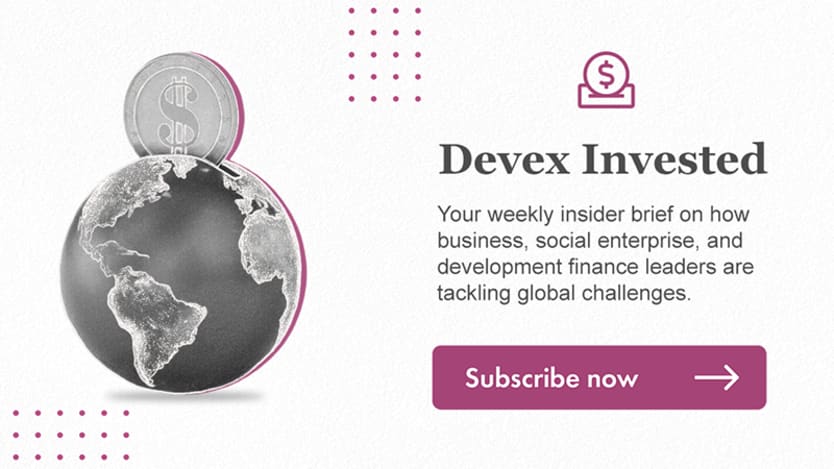
As the global economy grows more volatile and aid budgets are increasingly stressed, financing the Sustainable Development Goals has become more challenging. But there is a mostly untapped pool of capital that could bring new money to address such challenges: corporate balance sheets.
The conversation on how to mobilize private capital to close the growing SDG financing gap, which is estimated at $4.2 trillion a year, has largely focused on how to attract more investors. But corporations can also play a key role, not only through their products and services but by using their own financial assets, said Amit Bouri, the CEO of the Global Impact Investing Network.
It’s clear that public funds won’t be sufficient. So impact investments, which have intentional investments with specific, measurable, targets and objectives, for example around energy access, health care, or reducing poverty, could be part of the solution.
Companies worldwide often sit on large amounts of cash for acquisitions, operations, and as a backstop for future challenges. Could some of that be turned into corporate impact investments that could reduce poverty, improve health, or support climate adaptation?
The potential isn’t entirely clear, but GIIN estimates that there is some $2 trillion of capital in those corporate coffers and recently launched an initiative “designed to help them utilize cash balances and investments for positive impact.”
“We’re just scratching the surface,” Bouri told Devex ahead of the GIIN’s annual forum at The Hague last week. “Most companies don’t know it’s an option.”
Where corporations put their money and how they structure investments will differ, but it simply means using their cash to invest in companies or funds aimed at a specific social or environmental impact.
Some companies may create a team to make impact venture investments such as Salesforce, Johnson & Johnson, and Patagonia have already done.
Other companies are considering how to work with their supply chains and invest in strengthening and diversifying their suppliers. Companies such as Starbucks have invested in Root Capital, an agriculture-focused impact investing company, to sustainably source cocoa and coffee, Bouri explained. Danone, the French food company, wants to increase sourcing from regenerative agriculture, so it has partnered with impact investors.
It might also mean using company funds to invest in specific issues. PayPal has launched a racial equity fund and a gender fund, for example, aiming to invest a total of at least $500 million.
Rosita Najmi, the head of global social innovation at PayPal, told Devex that there are many reasons for making corporate impact investments, among them competition for talent, impact, innovation, and the potential reputational boost.
But as companies consider the best way forward, they must make a number of decisions: where in the corporate structure will the efforts live, for example, and how to get buy-in at the appropriate levels to ensure the program’s longevity, she said.
The investments should occur across asset classes, from long-term early-stage riskier venture funds to less risky, more liquid impact investments, Bouri said. GIIN hopes to help companies navigate how to use their assets to make impact investments.
“Impact investing is a huge opportunity to help companies meet goals,” such as finding or scaling solutions to reduce carbon emissions, he said.
Tech corporations Microsoft and Cisco have established climate impact investing funds and there are others considering how to support sustainable agriculture and sustainable forestry as part of their efforts.
Some companies may invest directly, while others will partner with existing impact investors. Many companies make strategic investments from their financial assets but doing so with an impact intention is fairly new.
GIIN plans to conduct a landscape survey that will test what companies think about impact investing, set a baseline for current corporate impact investing, and outline what is possible. The goal is for corporations “to see impact investing as part of a toolkit for sustainability,” Bouri said.
There is huge potential and demand for impact investments, Bouri said, and GIIN aims to “convert that into real results for people and the planet.”









